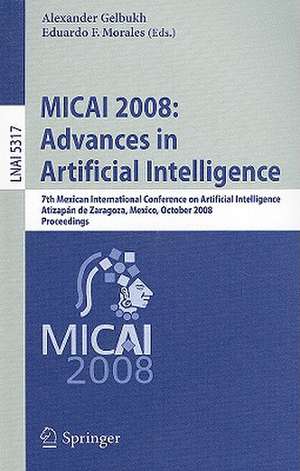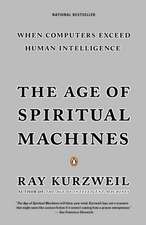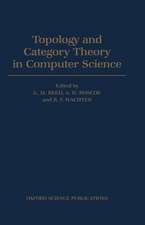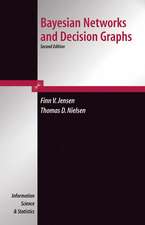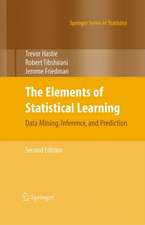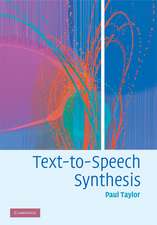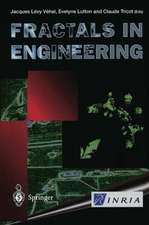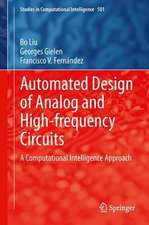MICAI 2008: Advances in Artificial Intelligence: 7th Mexican International Conference on Artificial Intelligence, Atizapán de Zaragoza, Mexico, October 27-31, 2008 Proceedings: Lecture Notes in Computer Science, cartea 5317
Editat de Alexander Gelbukh, Eduardo F. Moralesen Limba Engleză Paperback – 7 oct 2008
Din seria Lecture Notes in Computer Science
- 20%
 Preț: 1020.28 lei
Preț: 1020.28 lei -
 Preț: 395.25 lei
Preț: 395.25 lei - 20%
 Preț: 327.36 lei
Preț: 327.36 lei - 20%
 Preț: 556.96 lei
Preț: 556.96 lei - 20%
 Preț: 400.77 lei
Preț: 400.77 lei - 15%
 Preț: 558.12 lei
Preț: 558.12 lei - 20%
 Preț: 328.94 lei
Preț: 328.94 lei - 20%
 Preț: 340.04 lei
Preț: 340.04 lei - 20%
 Preț: 487.46 lei
Preț: 487.46 lei - 20%
 Preț: 629.71 lei
Preț: 629.71 lei - 20%
 Preț: 386.08 lei
Preț: 386.08 lei - 20%
 Preț: 489.11 lei
Preț: 489.11 lei - 20%
 Preț: 620.33 lei
Preț: 620.33 lei - 20%
 Preț: 733.68 lei
Preț: 733.68 lei - 20%
 Preț: 1033.45 lei
Preț: 1033.45 lei - 20%
 Preț: 782.57 lei
Preț: 782.57 lei - 20%
 Preț: 679.09 lei
Preț: 679.09 lei - 20%
 Preț: 330.54 lei
Preț: 330.54 lei - 20%
 Preț: 1137.10 lei
Preț: 1137.10 lei - 20%
 Preț: 435.28 lei
Preț: 435.28 lei - 20%
 Preț: 375.72 lei
Preț: 375.72 lei - 20%
 Preț: 342.61 lei
Preț: 342.61 lei - 20%
 Preț: 432.78 lei
Preț: 432.78 lei - 20%
 Preț: 904.16 lei
Preț: 904.16 lei - 20%
 Preț: 1391.87 lei
Preț: 1391.87 lei - 20%
 Preț: 373.80 lei
Preț: 373.80 lei - 20%
 Preț: 400.17 lei
Preț: 400.17 lei - 20%
 Preț: 1359.66 lei
Preț: 1359.66 lei - 20%
 Preț: 984.64 lei
Preț: 984.64 lei - 20%
 Preț: 560.93 lei
Preț: 560.93 lei - 20%
 Preț: 731.97 lei
Preț: 731.97 lei - 20%
 Preț: 563.29 lei
Preț: 563.29 lei - 20%
 Preț: 403.00 lei
Preț: 403.00 lei - 20%
 Preț: 793.92 lei
Preț: 793.92 lei - 20%
 Preț: 324.19 lei
Preț: 324.19 lei - 20%
 Preț: 733.68 lei
Preț: 733.68 lei - 20%
 Preț: 336.86 lei
Preț: 336.86 lei - 20%
 Preț: 327.36 lei
Preț: 327.36 lei - 20%
 Preț: 573.45 lei
Preț: 573.45 lei - 20%
 Preț: 558.53 lei
Preț: 558.53 lei - 20%
 Preț: 850.42 lei
Preț: 850.42 lei - 20%
 Preț: 560.93 lei
Preț: 560.93 lei - 20%
 Preț: 560.93 lei
Preț: 560.93 lei - 20%
 Preț: 631.96 lei
Preț: 631.96 lei - 20%
 Preț: 568.70 lei
Preț: 568.70 lei - 20%
 Preț: 488.90 lei
Preț: 488.90 lei - 20%
 Preț: 293.24 lei
Preț: 293.24 lei
Preț: 975.27 lei
Preț vechi: 1219.09 lei
-20%
Puncte Express: 1463
Preț estimativ în valută:
172.48€ • 204.11$ • 150.39£
172.48€ • 204.11$ • 150.39£
Carte tipărită la comandă
Livrare economică 03-17 aprilie
Specificații
ISBN-13: 9783540886358
ISBN-10: 3540886354
Pagini: 1062
Ilustrații: XXIV, 1036 p.
Dimensiuni: 155 x 235 x 38 mm
Greutate: 1.18 kg
Ediția:2008
Editura: Springer Berlin, Heidelberg
Colecția Springer
Seriile Lecture Notes in Computer Science, Lecture Notes in Artificial Intelligence
Locul publicării:Berlin, Heidelberg, Germany
ISBN-10: 3540886354
Pagini: 1062
Ilustrații: XXIV, 1036 p.
Dimensiuni: 155 x 235 x 38 mm
Greutate: 1.18 kg
Ediția:2008
Editura: Springer Berlin, Heidelberg
Colecția Springer
Seriile Lecture Notes in Computer Science, Lecture Notes in Artificial Intelligence
Locul publicării:Berlin, Heidelberg, Germany
Public țintă
ResearchCuprins
Invited Papers.- Logic and Reasoning.- Knowledge-Based Systems, Knowledge Representation and Acquisition.- Ontologies.- Natural Language Processing.- Machine Learning.- Pattern Recognition.- Data Mining.- Neural Networks.- Genetic Algorithms.- Hybrid Intelligent Systems.- Computer Vision and Image Processing.- Robotics.- Planning and Scheduling.- Uncertainty and Probabilistic Reasoning.- Fuzzy Logic.- Intelligent Tutoring Systems.- Multi-agent Systems and Distributed AI.- Intelligent Organizations.- Bioinformatics and Medical Applications.- Applications.
Textul de pe ultima copertă
This book constitutes the refereed proceedings of the 6th Mexican International Conference on Artificial Intelligence, MICAI 2008, held in Atizapán de Zaragoza, Mexico, in October 2008.
The 96 revised full papers presented together with 2 invited lectures were carefully reviewed and selected from 363 submissions. The papers are organized in topical sections on logic and reasoning, knowledge-based systems, knowledge representation and acquisition, ontologies, natural language processing, machine learning, pattern recognition, data mining, neural networks, genetic algorithms, hybrid intelligent systems, computer vision and image processing, robotics, planning and scheduling, uncertainty and probabilistic reasoning, fuzzy logic, intelligent tutoring systems, multi-agent systems and distributed ai, intelligent organizations, bioinformatics and medical applications, as well as applications.
The 96 revised full papers presented together with 2 invited lectures were carefully reviewed and selected from 363 submissions. The papers are organized in topical sections on logic and reasoning, knowledge-based systems, knowledge representation and acquisition, ontologies, natural language processing, machine learning, pattern recognition, data mining, neural networks, genetic algorithms, hybrid intelligent systems, computer vision and image processing, robotics, planning and scheduling, uncertainty and probabilistic reasoning, fuzzy logic, intelligent tutoring systems, multi-agent systems and distributed ai, intelligent organizations, bioinformatics and medical applications, as well as applications.
